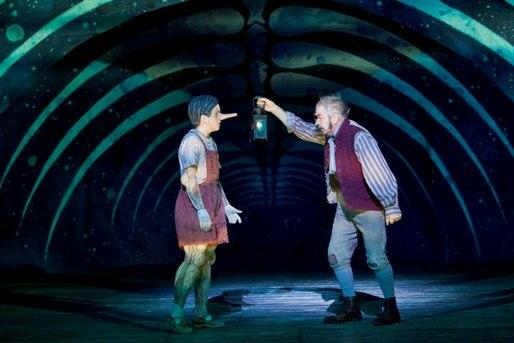There’s something deliciously extravagant about this Pinocchio by composer Jonathan Dove and librettist Alasdair Middleton. It’s remarkably faithful to Carlo Collodi’s picaresque text, and so we get everything. Elaborately costumed characters enter with spectacular props, then disappear having barely made their point, my favourite being the four top-hatted black rabbits who threaten to escort Pinocchio offstage in a coffin after he’s refused to take his medicine.
This revival of a piece first staged in 2007 is on a massive scale – elaborate sets, dancers, puppets, acrobats and a large chorus, and the music doesn’t sound easy. You somehow don’t expect contemporary opera to be so, well, grand; my last experience of Dove and Middleton was seeing their delightful chamber opera Swanhunter.
"Make me, make me,” calls a lonely log as the curtain lifts. Pinocchio’s subsequent eruption into life in Geppetto’s wood-lined workshop is accompanied by strobe flashes reminiscent of a 1930s horror film. Dove’s scoring throughout has a Technicolor vibrancy which never descends into cheap cliché and he’s adept at suggesting much with little – the wistful harp roulades which accompany Pinocchio’s dreams of becoming a real boy, or the snatches of accordion which give some of the crowd scenes a pungent, folky tang. In 20 scenes spread across two acts, the action has to flow swiftly, making the few moments of calm reflection the more touching; the reconciliation between Geppetto and Pinocchio in the belly of a fish is a lovely moment.
But it’s the delirious inventiveness of Martin Duncan’s direction and Francis O’Connor’s sets and costumes which really startle. The entry of the Big Green Fisherman who catches Pinocchio and threatens to eat him, or the gaudy glitz of Funland, where naughty schoolboys are transformed into donkeys and Pinocchio joins a circus. The happy ending is inevitable but doesn’t feel cheap; it’s surprisingly moving to see a human Pinocchio alone on stage in the final seconds looking down at the small wooden puppet he no longer is. Victoria Simmonds created the title role and she’s onstage for nearly three hours, energy never flagging. Jonathan Summers exudes paternal warmth as Geppetto.
In a large supporting cast, countertenor James Laing is silkily menacing as a rather camp Fox, while there is a virtuoso performance as the Cricket from Rebecca Bottone, comically dispatched with a mallet early in Act One. Orchestral playing under David Parry is predictably excellent, even if Dove’s frequently elaborate textures make some of the libretto inaudible. No matter – this is an outstanding modern opera, witty, poignant and brilliantly staged, and quite possibly a modern classic.
- The Adventures of Pinocchio at the Grand Theatre, Leeds until 31 December, but also touring in the interim to Edinburgh, Salford, Newcastle and Nottingham
- Find Pinocchio on Amazon















Add comment